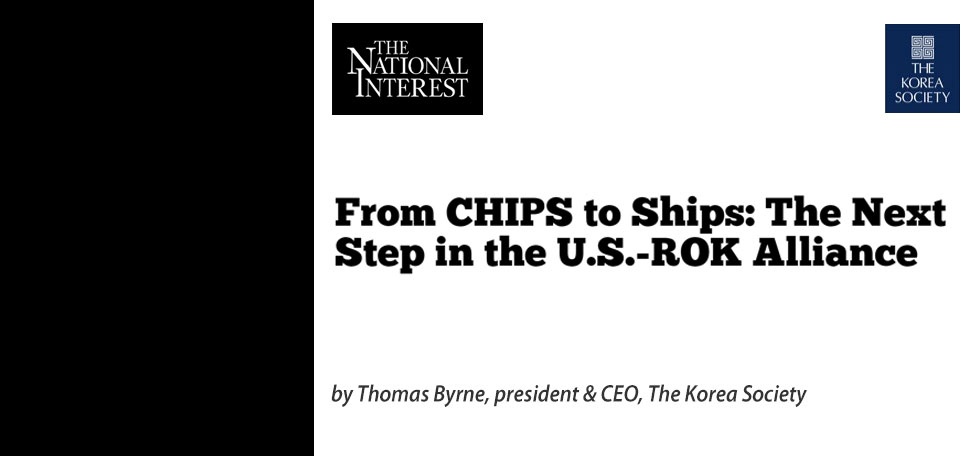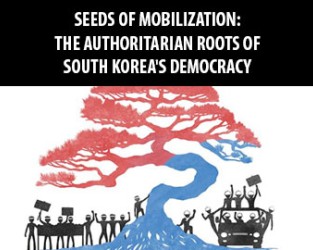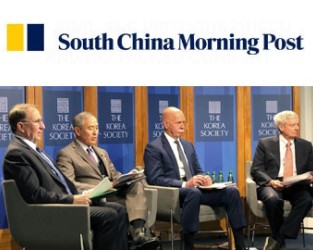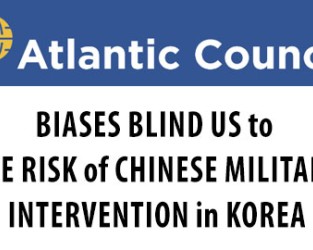![]()
![]()
February 7, 2016
Intl Reaction to North Korea's Missile Launch
Stephen E. Noerper
A month and a day after conducting its fourth nuclear test, North Korea launched a multi-stage rocket carrying a 440-pound satellite. The launch of the Taepodong missile from the Tongchang-ri site, near the North’s border with China, on a clear winter Sunday morning on 7 February was another defiant and provocative action, closely following the North’s four nuclear weapons test.
The United Nations Secretary General, Ban Ki-moon, decried the launch as "deeply deplorable." President Park Geun-hye castigated the North stating, “North Korea’s launch of a long-range missile not only constitutes an indisputable violation of UN Security Council resolutions, but yet another extreme provocation that ignores the ardent wish of the international community for peace.” China and Russia also formally expressed concerns, especially as China, the North’s main ally, had sent an emissary to dissuade Pyongyang's leadership just days prior to the launch. Japan's Prime Minister Abe called it "absolutely unacceptable.’ The United States Ambassador to the UN Samantha Power called the ballistic missile launch and last month’s nuclear test “hostile and illegal,” and South Korea’s Ambassador to the UN, Oh Joon deemed the launch an "outrage."
The launch was not a surprise, as North Korea had notified three UN agencies earlier that it would occur in the imminent future. The due-south launch trajectory, nonetheless, raised concern among nations in the region as the rocket passed over Okinawa and discarded a stage near the Philippines. Moreover, alarm in the international community was heightened by the evident technological advances so soon after the nuclear test. The rocket’s payload, twice the weight of its 2012 predecessor, was put into orbit with "complete success" according to North Korea. Although the 7 February launch signifies a technological advance, North Korea has not yet demonstrated the capacity to perfect reentry technology, part of what defines a successful intercontinental ballistic missile, guidance systems or warhead miniaturization.
China officially expressed "regret" and "concern," but called for a restrained response and negotiation. In contrast, The New York Times noted that a Weibo social media poll showed that two-thirds of Chinese users were supportive of a US strike on the North's nuclear sites. In the near-term, China will not likely support stricter sanctions called for by others on the UN Security Council and in Washington, Seoul, Tokyo and even Moscow. Chinese President Xi Jinping seems more focused on domestic issues—his sweeping anti-corruption campaign and on the country’s economic and financial challenges. China’s leadership seems to have calculated that accommodating North Korea and seeking to maintain stability on the Peninsula is better than instability; a potential humanitarian crisis on its borders in the event of tumult in North Korea, and the loss of a strategic buffer. China is in no mood to listen further to the United States given the South China Sea discord--a fact made clear in the Sino-US diplomatic posturing that followed the January 6 missile test.
The 7 February launch could have longer term strategic consequences for the peninsula and East Asia region. South Korea might have greater willingness to adopt the US Terminal High Altitude Area Defense system. If THAAD gains popularity with South Korea (and other Asian allies), China-US relations will be sorely tested, as China fears the system's check against its own capabilities. Tensions are already high given Beijing’s territorial claims in the South China Sea. North Korea's launch raises those tensions only higher.
All this leaves the international community decrying the test and February 7 launch, yet constrained in its ability to reign in a Pyongyang. Upcoming US-South Korea Key Resolve military maneuvers will see a spike in rhetoric that may rival or surpass that between North Korea and the US and its allies in the spring of 2013. And North Korean leader Kim Jong Un will continue to display toughness in advance of his May party congress, the first since 1980.
One might hope that later this year North Korea will initiate another diplomatic charm offensive, as it has regularly done so after spiking tensions over the years. What the young leader may have failed to calculate, however, is the deepening doubt in Beijing of his capabilities relative to his disruptions, his diplomatic insults to China's leadership, and his driving of Seoul to upgrade its military capabilities. Meanwhile the global non-proliferation regime stands tattered and in need of reinforcement.
A month and a day after conducting its fourth nuclear test, North Korea launched a multi-stage rocket carrying a 440-pound satellite. The launch of the Taepodong missile from the Tongchang-ri site, near the North’s border with China, on a clear winter Sunday morning on 7 February was another defiant and provocative action, closely following the North’s four nuclear weapons test.
The United Nations Secretary General, Ban Ki-moon[TB1] , decried the launch as "deeply deplorable." President Park Geun-hye castigated the North stating, “North Korea’s launch of a long-range missile not only constitutes an indisputable violation of UN Security Council resolutions, but yet another extreme provocation that ignores the ardent wish of the international community for peace.” China and Russia also formally expressed concerns, especially as China, the North’s main ally, had sent an emissary to dissuade Pyongyang's leadership just days prior to the launch. Japan's Prime Minister Abe called it "absolutely unacceptable.’ The United States Ambassador to the UN Samantha Power called the ballistic missile launch and last month’s nuclear test “hostile and illegal,” and South Korea’s Ambassador to the UN, Oh Joon deemed the launch an "outrage."
The launch was not a surprise, as North Korea had notified three UN agencies earlier that it would occur in the imminent future. The due-south launch trajectory, nonetheless, raised concern among nations in the region as the rocket passed over Okinawa and discarded a stage near the Philippines. Moreover, alarm in the international community was heightened by the evident technological advances so soon after the nuclear test. The rocket’s payload, twice the weight of its 2012 predecessor, was put into orbit with "complete success" according to North Korea. Although the 7 February launch signifies a technological advance, North Korea has not yet demonstrated the capacity to perfect reentry technology, part of what defines a successful intercontinental ballistic missile, guidance systems or warhead miniaturization.
China officially expressed "regret" and "concern," but called for a restrained response and negotiation. In contrast, The New York Times noted that a Weibo social media poll showed that two-thirds of Chinese users were supportive of a US strike on the North's nuclear sites. In the near-term, China will not likely support stricter sanctions called for by others on the UN Security Council and in Washington, Seoul, Tokyo and even Moscow. Chinese President Xi Jinping seems more focused on domestic issues—his sweeping anti-corruption campaign and on the country’s economic and financial challenges. China’s leadership seems to have calculated that accommodating North Korea and seeking to maintain stability on the Peninsula is better than instability; a potential humanitarian crisis on its borders in the event of tumult in North Korea, and the loss of a strategic buffer. China is in no mood to listen further to the United States given the South China Sea discord--a fact made clear in the Sino-US diplomatic posturing that followed the January 6 missile test.
The 7 February launch could have longer term strategic consequences for the peninsula and East Asia region. South Korea might have greater willingness to adopt the US Terminal High Altitude Area Defense system. If THAAD gains popularity with South Korea (and other Asian allies), China-US relations will be sorely tested, as China fears the system's check against its own capabilities. Tensions are already high given Beijing’s territorial claims in the South China Sea. North Korea's launch raises those tensions only higher.
All this leaves the international community decrying the test and February 7 launch, yet constrained in its ability to reign in a Pyongyang. Upcoming US-South Korea Key Resolve military maneuvers will see a spike in rhetoric that may rival or surpass that between North Korea and the US and its allies in the spring of 2013. And North Korean leader Kim Jong Un will continue to display toughness in advance of his May party congress, the first since 1980.
One might hope that later this year North Korea will initiate another diplomatic charm offensive, as it has regularly done so after spiking tensions over the years. What the young leader may have failed to calculate, however, is the deepening doubt in Beijing of his capabilities relative to his disruptions, his diplomatic insults to China's leadership, and his driving of Seoul to upgrade its military capabilities. Meanwhile the global non-proliferation regime stands tattered and in need of reinforcement.
[TB1]Pls cite the who in the UN, the GS’s office?










